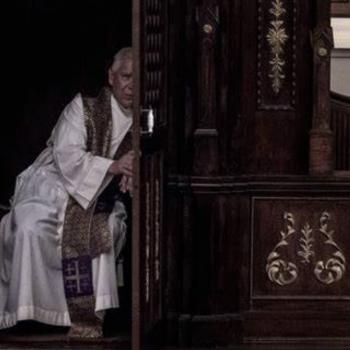At this writing, the grotesque moral stench of the Pennsylvania Grand Jury Report lingers in the nostrils, like a dead carcass. This only adds to pain inflicted by Cardinal McCarrick, the “Spotlight” scandals of 2002, along with Ireland, Chile, and more. In Canada, from where I write, the Indian Residential Schools unveil the same systematic abuses in the Truth and Reconciliation Report.
I am not sure what makes this feel so different this time. I was raised in a lay missionary family. I know of abuse by clergy — not sexual in my case, but abuses nonetheless. When Fr. Maciel was exposed as a perverse fraud, I observed from afar. I could relate enough to do some soul searching, but it never left me totally numb inside.
Now I feel numb. This is not the anesthetic numbness that escapes from pain. It is the vertigo-inducing numbness that swirls you around. I couldn’t keep up with the news or the over-one thousand page Pennsylvania report. The American Catholic Right and Left branches are back at it, going after and defending Pope Francis, yet again. I usually love these rumbles but I don’t have much except a nauseated disgust. I want to feel moral outrage, righteous anger, prophetic courage. I want to but I can’t — and I feel numb about that, too.

I am told that one can remain Catholic by clinging to Christ and the sacraments, no matter what clergy do. I am warned against the heresy of Donatism, that demands perfect clergy for valid sacraments. But I’m not asking for moral perfection. I’m demanding that clergy not abuse and rape and protect abusers and rapists. None of that is about the validity of sacraments: it is about the humanity and sacredness of the victims.
When a priest seduces a child, abuses them, and avoids reprimand from his bishop and even that child’s own family, does he, in some respect, do that in persona Christi? Obviously not, in the sacramental sense. But who else gets so much latitude and benefit of the doubt? Misplaced authority and power can be gained in many ways, even theological ways, as the divine right of kings shows us.
I was never foolish enough to trust clergy in toto. I love many of them, but only to a person, never as a whole. But many don’t know this. Many trust priests and bishops precisely because they are told to and they obey. The same is often true in the professoriate, my profession.
Through my numbness, I can assert that we cannot ignore people by loving Jesus and collecting the sacraments impersonally. Jesus was a person. He shared in our humanity. The Catholic Church is an apostolic church and the apostles are humans. We are called to be Christ to one another, as fully human persons. When any of us fail, we cannot neatly, and conveniently separate our flawed humanity from an impersonal sublime theology. No. When people fail, there is more than an administrative problem in the Church. There is rot and death that goes all the way down.
I’ve also been told that the Church has been through worse and will make it out just fine. Did the Church outlast the corruption of its history because it is so powerful and mighty? I thought that the Church, the bride of Christ, seeks to unite itself to a weak, beaten, abused saving Victim that dies and resurrects wearing His sacred wounds.
I do not think the Church should fear its own demise right now. I am numb even to its potential death. In the weeks and months ahead, I hope to find some hope in that. At the very least, I hope that I can avoid the sins of presumption and despair. For now, the latter is my great temptation, mea maxima culpa.
Sam Rocha is Assistant Professor of Philosophy of Education at the University of British Columbia, in Vancouver, Canada.












